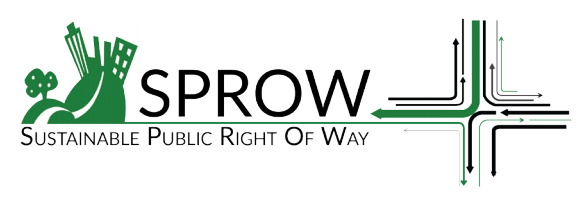Sustainable Public Rights of Way
 Relevant Committees
Relevant Committees
The Sustainable Public Rights of Way Subcommittee provides support and technical advice to NCTCOG's Public Works Council on sustainability issues associated with public works infrastructure. The Subcommittee's activities are reported regularly to the Public Works Council. View SPROW committee information.
The goals of the program are to compile best practices for sustainable public rights of way, review real examples of best practices within the region and hold workshop(s) in order to educate on and discuss best practices for sustainable public rights of way.
The goals of Sustainable Public Rights-of-Way are to improve infrastructure within public rights of way including but not limited to:
- To promote multi-modal forms of transportation
- Improve air and water quality
- Provide walkable communities
- Provide safer and healthier neighborhoods and improve quality of life
- Improve infrastructure life cycle and performance
- Streamline construction
- Ensure regulatory compliance
- Promote economic development
- Promote integration of rights of way and surrounding land use
- Promote context-sensitive design
- Balance environmental, scenic, aesthetic, cultural and natural resources, as well as community and transportation needs.
The Roadmap to a Sustainable Public Right of Way is a document intended to be a resource to both public officials and private developers to improve the sustainability of their projects constructed within the public rights-of-way.
- The Roadmap to a Sustainable Public Right of Way
The Roadmap to a Sustainable Public Right of Way is a document intended to be a resource to both public officials and private developers to improve the sustainability of their projects constructed within the public rights-of-way. - NCTCOG Green Infrastructure Guidebook, May 2017
The guidebook aids professionals in assessing choices for integrating green infrastructure practices into various transportation projects such as roadways, sidewalks, parking facilities, and trail projects. The guidebook provides costs and benefits of these green practices, local case studies, and key information related to long-term cost effectiveness, community improvement, and environmental impacts. - NCTCOG Sustainability in the Built Environment map app
- NCTCOG LEED Building map app
- integrated Stormwater Management (iSWM)
- Transportation integrated Stormwater Management (TriSWM)
- Center of Development Excellence
- Smart Growth America, Complete Streets
The NCTCOG Environment & Development Case Studies web mapping application allows you to explore case studies related to development excellence, solar energy, water, and solid waste in the North Central Texas region.
SPROW Education Forum
For additional information, please contact Madisson Dunn or Corinne Buckley.

